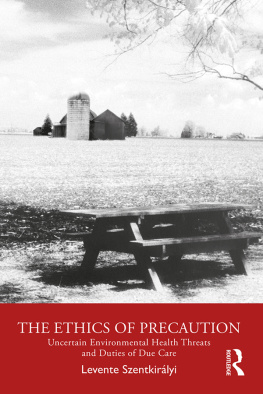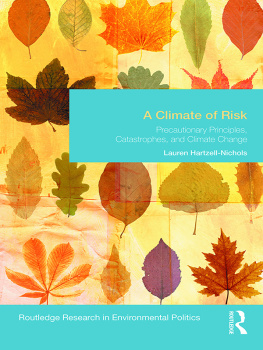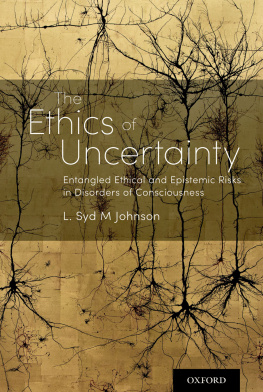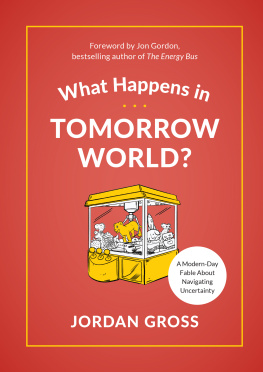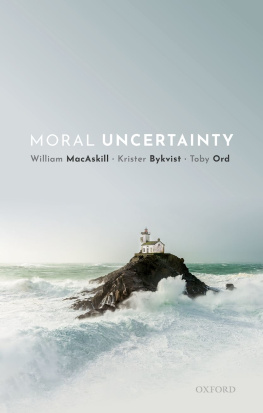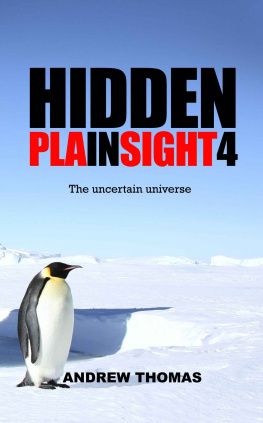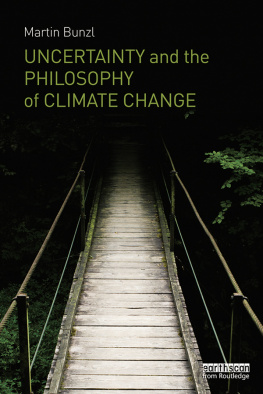The precautionary principle is proving of unusual significance as new forms of biotechnology and chemical synthesis offer tantalizing contradictions as to any proof of associated harm for all manner of exposed populations now and in the long-term. This is even more politically salient as fresh trade agreements are being sought between nations with many differing interpretations of precaution. Levente Szentkirlyi offers a brilliant, case study rich analysis of a new moral position of a reasoned duty of care on all creators of possible risks, both established and still untried. Would that his prescriptions be followed.
Tim ORiordan, Professor Emeritus of Environmental Sciences, University of East Anglia, Norwich, UK, and editor of two books on the precautionary principle across the world
In The Ethics of Precaution, Dr. Szentkirlyi offers perhaps the most complete and compelling moral philosophical defense available for use of the precautionary principle in environmental, health, and safety regulation. But the book does much more than this: It also engages with law, history, economics, environmental science, and a range of other relevant bodies of expertise to advance its argument. The result is a powerful philosophical case for the precautionary principle and an exemplary work of interdisciplinary scholarship.
Douglas Kysar, Joseph M. Field 55 Professor of Law, Yale University, USA, and author of Regulating from Nowhere: Environmental Law and the Search for Objectivity
The Ethics of Precaution
Thousands of substances are manufactured in the United States to which the public is routinely exposed and for which toxicity data are limited or absent. Some insist that uncertainty about the severity of potential harm justifies implementing precautionary regulations, while others claim that uncertainty justifies the absence of regulations until sufficient evidence confirms a strong probability of severe harm.
In this book, Levente Szentkirlyi overcomes this impasse in his defense of precautionary environmental risk regulation by shifting the focus from how to manage uncertainty to what it is we owe each other morally. He argues that actions that create uncertain threats wrongfully gamble with the welfare of those who are exposed and neglect the reciprocity that our equal moral standing demands. If we take the moral equality and rights of others seriously, we have a duty to exercise due care to strive to prevent putting them in possible harms way.
The Ethics of Precaution will be of great interest to researchers, educators, advanced students, and practitioners working in the fields of environmental political theory, ethics of risk, and environmental policy.
Levente Szentkirlyi is a teaching faculty member at the University of Colorado at Boulder, where he teaches discipline-specific academic writing and problems of social justice. Broadly trained in political science and philosophy, his interdisciplinary research interests bridge normative political theory with environmental policy and broadly consist of environmental justice, moral responsibility, and the ethics of risk. Dr. Szentkirlyis appreciation for scholarship that intersects different disciplines has deeply influenced his student-centered pedagogy and has shaped substantive research interests in teaching and learning in political science.
First published 2020
by Routledge
52 Vanderbilt Avenue, New York, NY 10017
and by Routledge
2 Park Square, Milton Park, Abingdon, Oxon, OX14 4RN
Routledge is an imprint of the Taylor & Francis Group, an informa business
2020 Taylor & Francis
The right of Levente Szentkirlyi to be identified as author of this work has been asserted by him in accordance with sections 77 and 78 of the Copyright, Designs and Patents Act 1988.
All rights reserved. No part of this book may be reprinted or reproduced or utilised in any form or by any electronic, mechanical, or other means, now known or hereafter invented, including photocopying and recording, or in any information storage or retrieval system, without permission in writing from the publishers.
Trademark notice: Product or corporate names may be trademarks or registered trademarks, and are used only for identification and explanation without intent to infringe.
Library of Congress Cataloging-in-Publication Data
A catalog record for this book has been requested
ISBN: 978-0-367-19374-4 (hbk)
ISBN: 978-0-429-24431-5 (ebk)
Typeset in Times New Roman
by Apex CoVantage, LLC
This book is written in memory of my late father, classical pianist and composer, professor, photographer, and Hungarian freedom fighter, Dr. Andrs Szentkirlyi. Days before my father died from complications of a heart attack, as he lay in critical condition on a gurney waiting to be helicoptered to an area hospital, in what would prove to be the last lucid exchange I would have with him, my father took my hand and reminded me to pay our utility bill on time with the check he had left on his desk in his study. Even in that tense moment, I recall being puzzled how he could be concerned with such trivial matters as avoiding a late fee when his life was in the balance. Admittedly, my family always struggled financially, so even modest unexpected expenses created difficulties for us. Further, having endured many hardshipsnot the least of which included surviving the Second World War in Budapest, having his life shaken by the 1956 Hungarian revolution, and losing his first son to leukemiamy father took very little for granted. In retrospect, however, this exchange with my father had neither to do with our finances nor a reluctance to accept the gravity of his situation, but rather testified to his perseverance and his deep sense of responsibility for his family.
Unexpectedly drawn into Hungarys armed resistance against Soviet oppression (in which his older sister, a young nurse, was shot and killed while aiding victims of a street battle), after surviving one of the violent street battles of the uprising, my father was seized by Soviet forces and Hungarian secret police, detained for several days, interrogated, and beaten. What ultimately saved him from certain execution was his youth: for in a time of moral bankruptcy, the Soviets oddly refrained from killing revolutionaries who were not yet legally adults. Understanding, however, that upon his 18th birthday he would be re-apprehended for his known support of the resistance, my father was compelled to abandon his family and he escaped to Austriasoon after which he settled in Rome, only to enlist with the U.S. Army in 1959 to immigrate to the United States with hope in a better future. Overcoming both language and financial barriers to continuing his education and musical training, he earned degrees from premier music conservatories and research institutions in the country. My fathers doctoral studies and pursuit of a college teaching career required a great many sacrifices of him and our family, which made his wrongful termination as an assistant professor by the Music Department at Bowling Green State University, as well as his subsequent failure to return to academia, that much harder to bear. Forced to table his talent and passion for composing and teaching classical music, after years of accepting whatever work he could secure to support his family, my father finally settled into photographyturning what had once been a hobby into his new professionand he struggled the rest of his life as a small business owner. Yet he never bemoaned his circumstances, or became resentful, or projected his disappointments and frustrations onto others. He simply did what was necessary to persevere. And despite the unreasonable concessions life imposed on him, my father fostered an optimistic and cheerful disposition, finding purpose in his family and joy in lifes simple pleasuresan enduring testament to his integrity and strong character.

